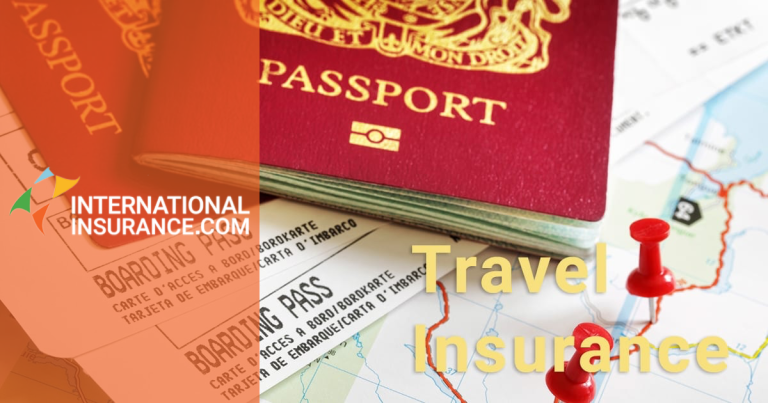Best Travel International Insurance Your Guide
Best travel international insurance is crucial for smooth and worry-free adventures abroad. It safeguards you against unexpected events, from medical emergencies to lost luggage and trip disruptions. This comprehensive guide explores the various types of coverage, factors to consider, top providers, policy terms, and essential coverage considerations to help you choose the perfect plan for your next international trip.
Understanding the diverse range of international travel insurance options can be daunting. This guide simplifies the process by breaking down the key elements, from comparing different coverage levels and providers to navigating complex policy terms. We’ll also provide practical tips and examples to help you make an informed decision.
Overview of International Travel Insurance
International travel insurance is a crucial safeguard for any trip abroad. It provides peace of mind by protecting you against unforeseen events, from minor inconveniences to serious emergencies. This comprehensive coverage can significantly reduce the financial burden and stress associated with travel mishaps.
Core Benefits of International Travel Insurance
International travel insurance offers a wide array of benefits designed to alleviate potential issues during your travels. These benefits range from medical emergencies to lost luggage and trip cancellations, ensuring a smoother and more secure travel experience. Comprehensive plans often include coverage for medical expenses, lost or stolen belongings, trip interruptions, and even personal liability. Ultimately, insurance allows travelers to focus on enjoying their adventures without worrying about the unexpected.
Types of Coverage
Understanding the different types of coverage is key to selecting the right plan for your needs. International travel insurance typically encompasses three primary areas: medical coverage, trip cancellation/interruption coverage, and baggage coverage.
- Medical coverage typically includes expenses related to illness or injury while abroad. This often includes emergency medical evacuation, hospitalisation, and medical treatment. This coverage is vital for unforeseen medical situations, ensuring you receive necessary care without incurring exorbitant costs.
- Trip cancellation/interruption coverage protects you from financial losses if your trip needs to be canceled or interrupted due to unforeseen circumstances. This could include pre-existing medical conditions worsening, natural disasters, or family emergencies. This coverage can reimburse pre-paid expenses, such as flights and accommodation.
- Baggage coverage offers protection against lost, damaged, or stolen luggage. This can be a significant advantage, especially for those traveling with expensive or irreplaceable items. This coverage can help replace lost or damaged belongings.
Importance of Destination Consideration
The destination you’re traveling to significantly impacts the insurance you need. Different countries have varying healthcare systems and costs, affecting medical coverage requirements. For instance, traveling to a country with limited English-speaking medical staff or a less developed healthcare infrastructure might necessitate a plan with higher medical evacuation coverage. Likewise, countries known for high crime rates may require a more robust baggage coverage. The cost of living and potential risks in a destination influence the necessary coverage level.
Situations Requiring Insurance
International travel insurance is indispensable in various situations. It’s crucial for medical emergencies, where you might need immediate and expensive medical care. Insurance can significantly reduce the financial burden of unexpected illnesses or injuries. Similarly, lost luggage, especially when it contains essential items or irreplaceable belongings, can cause significant inconvenience and financial losses. The insurance can help with replacements or reimbursements for these losses.
Coverage Levels Comparison
The table below highlights the differences between basic and comprehensive international travel insurance plans.
| Feature | Basic Coverage | Comprehensive Coverage |
|---|---|---|
| Medical Expenses | Limited coverage for basic medical care. | Extensive coverage for a wide range of medical expenses, including emergency evacuation. |
| Trip Cancellation/Interruption | Limited coverage for specific circumstances. | Comprehensive coverage for various reasons for trip cancellation or interruption. |
| Baggage Coverage | Limited coverage for lost or damaged baggage. | Comprehensive coverage for lost, damaged, or stolen baggage, including valuable items. |
| Emergency Assistance | Basic assistance services. | Comprehensive assistance services, including 24/7 emergency assistance. |
| Personal Liability | Limited coverage for personal liability. | Extensive coverage for personal liability. |
Factors to Consider When Choosing a Plan

Source: royalhow.com
Choosing the right international travel insurance is crucial for a smooth and worry-free trip. Understanding the factors influencing cost, common exclusions, and provider reputations can help you select a policy that best suits your needs. A thorough evaluation of these elements empowers you to make an informed decision, ensuring your trip is protected against unforeseen circumstances.
Factors Affecting Insurance Cost
Various elements contribute to the overall cost of an international travel insurance plan. Duration of travel, destination, and the age of the traveler are key determinants. Longer trips typically result in higher premiums due to the increased exposure to potential risks. Similarly, destinations with higher crime rates, political instability, or challenging medical facilities often come with higher premiums. Age also plays a role; younger travelers are often perceived as higher-risk, leading to potentially more expensive policies.
Common Exclusions in International Travel Insurance
Insurance policies usually contain exclusions to clarify what is not covered. Pre-existing medical conditions, certain types of activities (like extreme sports or risky hobbies), and damage caused by intentional actions are frequently excluded. It is essential to carefully review the policy’s fine print to understand the specific exclusions and ensure that the coverage aligns with your planned activities and health status. Travelers should always consult the policy wording to avoid unforeseen gaps in coverage. Common exclusions can include coverage for pre-existing medical conditions, certain types of sports and activities, and intentional damage or self-harm.
Comparing Insurance Providers Based on Customer Reviews
Evaluating customer reviews can offer valuable insights into the quality of service and claim handling processes. Reading online reviews, comparing ratings, and looking for patterns in feedback from various sources can provide a better understanding of a provider’s reliability and responsiveness. Check online review platforms for feedback on customer service, claim processing speed, and overall satisfaction. Pay attention to reviews discussing specific aspects like claim settlement times and the helpfulness of customer support.
Importance of Reading the Fine Print and Policy Details
Understanding the nuances of the insurance policy is paramount. Policy details the scope of coverage, exclusions, and limitations. Carefully reading the policy document and clarifying any uncertainties with the provider are essential steps in ensuring that the policy aligns with your specific needs. Do not rely solely on summaries or marketing materials. Thorough reading is critical to understanding the exact terms and conditions, and it will help to avoid any surprises or disputes during a claim.
Factors Influencing Plan Selection
| Factor | Explanation | Impact on Cost |
|---|---|---|
| Travel Duration | Longer trips generally have higher premiums. | Higher |
| Destination | Destinations with higher risks (e.g., political instability, challenging healthcare) may have higher premiums. | Variable |
| Traveler’s Age | Younger travelers are often considered higher risk, resulting in higher premiums. | Higher |
| Pre-existing Conditions | Disclosure and coverage are critical. Some conditions may not be covered. | Variable |
| Type of Activities | Extreme sports or risky hobbies may be excluded. | Variable |
Comparing Top International Travel Insurance Providers
Choosing the right international travel insurance is crucial for a smooth and worry-free trip. Understanding the strengths and weaknesses of different providers, along with their cost structures, is essential for making an informed decision. This section delves into a comparison of top providers, highlighting their key features, costs, and user experiences to help you select the best plan for your needs.
A comprehensive comparison involves examining various factors beyond just the price. This includes the breadth of coverage, the claims process, and the reputation of the insurer. Testimonials from past customers can offer valuable insights into the practical aspects of dealing with the provider.
Top International Travel Insurance Providers
Several companies dominate the international travel insurance market, each with its strengths and weaknesses. A critical assessment requires considering factors like coverage specifics, customer service, and pricing.
- Company A: Known for its comprehensive coverage, including extensive medical evacuation and trip interruption options. However, customer reviews suggest a slightly longer claims process compared to other providers. Pricing tends to be on the higher end, but the value of the comprehensive coverage might justify the cost for some travelers.
- Company B: A popular choice for its competitive pricing and user-friendly online platform. Their coverage is generally considered adequate, but some customers have reported limitations in specific areas, such as trip cancellation due to unforeseen circumstances. A robust online support system often mitigates this issue.
- Company C: Specializes in providing customized insurance packages. Their flexibility allows for tailoring coverage to individual needs. This personalization can result in higher costs compared to standardized plans. The quality of service varies depending on the agent handling the policy, which can be a double-edged sword.
- Company D: Focuses on budget-friendly options, making it an attractive choice for cost-conscious travelers. Coverage may be less extensive compared to premium providers, but it’s suitable for travelers with basic needs. Customer service is generally responsive, though not as extensive as some other providers.
Cost Structures and Coverage Comparison
Pricing models for travel insurance differ significantly among providers. This variance reflects the scope and level of coverage offered.
| Provider | Basic Coverage (USD) | Comprehensive Coverage (USD) | Medical Evacuation (USD) | Trip Interruption (USD) |
|---|---|---|---|---|
| Company A | $150 | $250 | $100,000 | $500 |
| Company B | $120 | $200 | $75,000 | $300 |
| Company C | Variable | Variable | Variable | Variable |
| Company D | $80 | $150 | $50,000 | $200 |
The table above presents a simplified comparison. Actual costs vary based on factors such as travel duration, destination, and specific add-ons. It is crucial to compare the detailed coverage policies for accurate cost estimations.
User Testimonials and Experiences
Customer feedback can provide insights into the practical application of policies.
“Company A’s comprehensive coverage was a lifesaver during my medical emergency abroad. The claims process was slightly lengthy, but the end result was worth the wait.” – Customer Review
“Company B’s user-friendly platform made the purchase process seamless. While coverage was adequate, I felt the lack of trip cancellation options was a significant drawback.” – Customer Review
Understanding Key Policy Terms and Conditions
Navigating the complexities of international travel insurance policies can feel daunting. Understanding the key terms and conditions is crucial for making informed decisions and ensuring your trip is protected. This section delves into vital policy elements, enabling you to choose the best coverage for your needs.
Pre-existing Conditions, Best travel international insurance
Pre-existing conditions are health issues you’ve had diagnosed or treated before your trip. Insurance policies often have specific clauses regarding coverage for these conditions. Some policies may exclude coverage for pre-existing conditions entirely, or they may limit the extent of coverage if the condition requires treatment during the trip. It’s essential to carefully review the policy wording to understand the specific stipulations for pre-existing conditions. For example, a policy might exclude coverage for treatment of a previously diagnosed heart condition, but it may cover an acute heart attack that occurs during the trip.
Medical Evacuation
Medical evacuation, a critical aspect of travel insurance, covers the cost of transporting you to a medical facility when you’re injured or become ill abroad. This often involves air ambulance services and other specialized transportation. The cost of medical evacuation can be substantial, and comprehensive travel insurance can significantly reduce this financial burden. For example, if you suffer a serious injury requiring immediate medical attention in a remote location, medical evacuation coverage ensures timely and appropriate care.
Emergency Assistance Services
Emergency assistance services are vital for resolving unforeseen situations. These services provide 24/7 support for medical emergencies, lost luggage, legal issues, and other urgent matters. The availability of reliable emergency assistance services can be critical for maintaining peace of mind and ensuring your safety and well-being during your trip. For example, a service may help you find a local doctor or hospital when you need medical attention, arrange for urgent repairs or replacement of lost travel documents, or provide translation services.
Deductibles, Limits, and Co-pays
Policies often include deductibles, limits, and co-pays. A deductible is the amount you must pay out-of-pocket before the insurance company begins covering costs. Limits refer to the maximum amount the insurance company will pay for a particular type of claim. Co-pays are fixed amounts you pay for specific services, such as doctor visits or medications. Understanding these terms allows you to accurately assess the financial responsibility you’ll have if you require medical assistance during your trip. For example, a policy may have a $500 deductible for medical expenses and a maximum limit of $10,000 per trip, with a $25 co-pay for each doctor’s visit.
Essential Policy Terms and Their Implications
| Policy Term | Meaning | Implications |
|---|---|---|
| Pre-existing Condition | Health issues diagnosed or treated before the trip | Coverage may be limited or excluded. Carefully review policy language. |
| Medical Evacuation | Cost of transporting you to a medical facility | It can be expensive, crucial for urgent care abroad. |
| Emergency Assistance | 24/7 support for various emergencies | Provides valuable assistance in unforeseen situations. |
| Deductible | Amount paid out-of-pocket before insurance coverage | Influences your financial responsibility for claims. |
| Limits | The maximum amount of insurance will pay | Establishes a financial cap on coverage. |
| Co-pay | Fixed amount for specific services | Contributes to the total cost of care. |
Essential Coverage Considerations

Source: internationalinsurance.com
Choosing the right international travel insurance is crucial for a smooth and worry-free trip. Beyond basic coverage, understanding specific protections is key to safeguarding your investment and well-being while abroad. Careful consideration of various potential scenarios, from medical emergencies to lost luggage, can help you make an informed decision.
Medical Emergencies and Critical Illnesses
Comprehensive medical coverage is paramount when traveling internationally. This includes not only routine medical expenses but also potentially life-altering situations like critical illnesses or accidents. Insurance plans should cover emergency medical treatment, hospital stays, and repatriation if necessary. Consider the potential cost of medical care in your destination; some countries have significantly higher costs than your home country. Pre-existing conditions can also affect coverage, so it’s vital to thoroughly review the policy details and understand any exclusions or limitations.
Trip Cancellations or Interruptions
Unexpected events can disrupt travel plans. Coverage for trip cancellations or interruptions due to unforeseen circumstances, such as illness, natural disasters, or family emergencies, can provide financial protection. This protection ensures that you’re compensated for non-refundable expenses, including flights, accommodation, and tours. Consider scenarios like a sudden illness preventing you from traveling or a family emergency requiring your immediate presence. The policy should articulate the specific circumstances covered and the process for claiming compensation.
Lost or Damaged Luggage
Lost or damaged luggage can be a significant inconvenience during a trip. Travel insurance can provide reimbursement for lost or damaged belongings, helping you replace essential items and maintain your comfort. This coverage can include clothing, electronics, and other personal belongings. Consider the value of your luggage and the potential costs of replacing it, especially if you have expensive equipment or sentimental items. This protection can alleviate the stress and financial burden of a luggage incident.
Natural Disasters in the Destination
Natural disasters are unpredictable events that can significantly impact travel plans. International travel insurance should include coverage for disruptions caused by natural disasters, such as earthquakes, hurricanes, or floods. This coverage could include reimbursement for cancelled flights, lost accommodations, or other travel-related expenses due to the disaster. Research the potential for natural disasters in your destination before purchasing a policy. Some destinations have a higher risk than others. Policies may have limitations or exclusions for specific types of natural disasters.
Critical Coverage Areas
| Scenario | Essential Coverage |
|---|---|
| Medical Emergency (e.g., accident, illness) | Emergency medical treatment, hospital stays, repatriation, and coverage for pre-existing conditions (review exclusions). |
| Trip Cancellation/Interruption | Compensation for non-refundable expenses (flights, accommodation, tours) due to unforeseen circumstances. |
| Lost/Damaged Luggage | Reimbursement for lost or damaged belongings, including essential items and sentimental items. |
| Natural Disaster | Coverage for disruptions due to natural disasters, including cancellations, lost accommodations, and travel-related expenses. |
Tips for Choosing the Best Plan
Choosing the right international travel insurance is crucial for a smooth and worry-free trip. A well-selected plan can provide financial protection against unforeseen circumstances, allowing you to focus on enjoying your adventure. Understanding key aspects of various plans is vital for making an informed decision.
Comprehensive Coverage is Paramount
Comprehensive coverage extends beyond the basics, encompassing a wider range of potential issues. This includes not only medical emergencies but also trip disruptions, lost luggage, and even cancellations due to unforeseen circumstances. A comprehensive plan offers greater peace of mind and financial security throughout your journey. Ensure the plan covers all potential risks relevant to your travel style and destination. For example, a plan covering adventure sports or activities in remote areas is crucial for certain travel types.
Understanding Cancellation Policies is Essential
Cancellation policies: Article on the circumstances under which you can receive a refund or alternative arrangements if you need to cancel your trip. Understanding these policies is critical, as unforeseen events can necessitate trip changes. Carefully review the terms and conditions regarding pre-existing medical conditions, natural disasters, or sudden illness. A plan with flexible cancellation terms can offer peace of mind in case of unexpected events. For instance, a policy that allows for cancellation due to a family emergency can be very helpful.
Adequate Medical Coverage for Various Scenarios
Medical coverage is a fundamental aspect of travel insurance. It should provide adequate financial protection for various medical scenarios, including emergency medical treatment, hospitalization, and repatriation. Consider the potential costs of medical treatment in your destination and ensure the plan covers these expenses. Factors such as pre-existing conditions and potential need for specific treatments, such as dental care or specialized medical care, should be considered when selecting a plan. For example, travelers to countries with limited healthcare infrastructure might need higher medical coverage.
Purchasing Directly vs. Through Agents
Purchasing travel insurance directly from the provider or through a travel agent presents distinct advantages. Direct purchase allows for better control over the policy details, while travel agents can offer personalized advice and potentially better deals. Weigh the benefits and drawbacks based on your needs and comfort level with navigating insurance policies. Ultimately, the best choice depends on your preference and the available options. For example, a traveler who values personalized service might benefit from using a travel agent, while a time-constrained traveler might opt for direct purchase.
Real-World Examples of Benefits
Numerous travelers have experienced the benefits of having appropriate travel insurance. One traveler, faced with a sudden illness requiring emergency medical care in a foreign country, benefited from their insurance plan’s quick response and substantial coverage. Another traveler who had their luggage lost during transit received prompt and fair compensation, thanks to their comprehensive travel insurance policy. These examples highlight how travel insurance can provide invaluable support during unexpected events, allowing travelers to focus on recovery or alternative arrangements without financial strain.
Evaluating and Selecting an Insurance Plan

Source: property9ja.com
Choosing the right international travel insurance plan is crucial for a smooth and worry-free trip. A well-selected plan can protect you from unexpected events, ensuring your financial security and peace of mind while abroad. This section details a structured approach to evaluating and selecting the most suitable plan for your specific needs.
Evaluating international travel insurance plans requires a methodical approach, going beyond just price comparisons. A thorough understanding of your travel plans, potential risks, and personal circumstances is essential to make an informed decision. This process involves comparing policy terms, coverage amounts, and exclusions to find the best fit for your needs and budget.
Assessing Individual Needs
Understanding your specific travel needs is fundamental to choosing the right plan. Consider the duration and destination of your trip, the activities you’ll be engaging in, and any pre-existing medical conditions. Factors like the nature of your trip, group travel, and potential for risky activities should be evaluated for appropriate coverage. For instance, a trekking expedition in Nepal requires different coverage than a relaxing beach vacation in the Caribbean.
Comparing Plans and Making Informed Decisions
A critical step involves comparing various plans side-by-side. Use a structured approach, focusing on essential coverages. Look for plans offering comprehensive medical coverage, emergency evacuation, trip interruption, lost baggage, and personal liability protection. This meticulous comparison ensures that you select a plan that meets your specific needs. A well-prepared comparison table aids in this process, allowing for quick assessment of various plans.
Checklist for Evaluating Plans
A checklist facilitates a structured approach to evaluating international travel insurance plans.
- Trip Details: Duration, destination, activities, and potential risks.
- Coverage Amounts: Medical expenses, emergency evacuation, trip interruption, lost baggage, and personal liability.
- Policy Exclusions: Pre-existing conditions, specific activities, and geographical limitations.
- Provider Reputation: Financial stability and customer service track record.
- Cost and Value: Comparing costs to the benefits offered.
- Customer Reviews: Examining past customer experiences.
Comparing Features, Costs, and Benefits
A well-organized comparison table helps in assessing different plans effectively. This table should articulate the features, costs, and benefits of each plan.
| Plan | Medical Coverage (USD) | Emergency Evacuation (USD) | Trip Interruption (USD) | Cost (USD) |
|---|---|---|---|---|
| Plan A | 100,000 | 50,000 | 1,000 | 150 |
| Plan B | 200,000 | 100,000 | 2,000 | 250 |
| Plan C | 50,000 | 25,000 | 500 | 100 |
This table exemplifies a comparative analysis. Note that costs and coverage amounts are illustrative and may vary based on the plan provider.
Obtaining Quotes and Purchasing Insurance Online
Most providers offer online quoting tools. Use these tools to input your travel details and receive personalized quotes. Compare quotes from multiple providers to find the best value. Ensure secure payment options are available. Review the policy details carefully before purchasing.
A thorough evaluation, a well-prepared checklist, and a comparison table assist in the process of choosing the best travel insurance plan.
Conclusive Thoughts: Best Travel International Insurance
In conclusion, securing the right international travel insurance is a vital step for any international traveler. By carefully considering your needs, comparing providers, understanding policy terms, and prioritizing essential coverage, you can protect yourself and your trip from unforeseen circumstances. This guide provides the necessary information to make an informed decision and ensure a safe and enjoyable travel experience.





